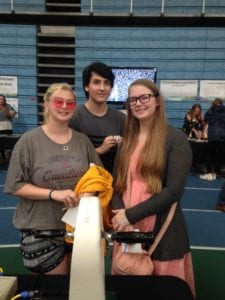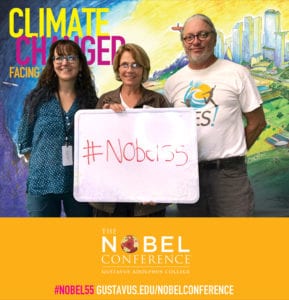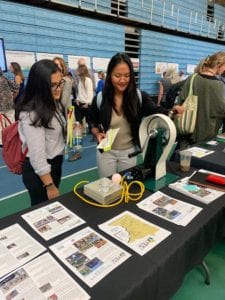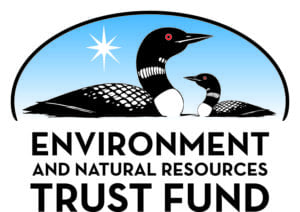By Shelli-Kae Foster, Program Director
“Climate Changed.” The title of the 55th Nobel Conference at Gustavus Adolphus College makes a clear statement – our climate has changed and now we all have to learn to adapt and to make changes to our policies and lifestyles. The 2-day conference was sold out which demonstrates how important this topic is to people of all ages and with the line-up of notable speakers, no one was disappointed. After watching Richard Alley (Professor of Geosciences, Pennsylvania State University) on PBS numerous times, I was especially excited to see him present in person. Alley was the second speaker of the day after Amitav Ghosh (Novelist, historian, essayist and author). Alley talked about his time studying ice cores in the Arctic, he discussed how to build a sustainable energy system noting that it is a big task, but it also creates huge opportunities, and he entertained us with stories of everyday life in the Arctic. Alley also commented during the panel discussion that “risk management is how we have to think of climate change now.”
Diana Liverman (Regents Professor of Geography and Development, University of Arizona) was the third speaker of the day. Liverman opened up her talk with a quote by Ban Ki-Moon, “We are the first generation that can put an end to poverty, and we are the last generation that can put an end to climate change.” LIverman pointed out that climate change is undermining sustainable development by increasing food insecurity, increasing disaster risks, increasing health risks, and damaging the eco system. She lifted up a project in near her home in Texas of students and an agri-voltaic project. She saw this as a triple win: the school captured solar energy; food was produced for the lunch line; and students learned about local food production and clean energy!
YES! staff (Taylor Templer, Tom McDougall, and Deb Groebner) joined me at the Sustainability Showcase where many high school and middle school students stopped by to find out more about us! We hope students see the connection between how YES! can be part of the solution to the many challenges our planet faces today. If you know of a school that would like to be part of a network of schools building bridges to their community and working to slow down the effects of climate change, contact me at [email protected] or any of our regional coordinators.




Major funding for the YES! program was provided by the Minnesota Environment and Natural Resources Trust Fund as recommended by the Legislative-Citizen Commission on Minnesota Resources (LCCMR).